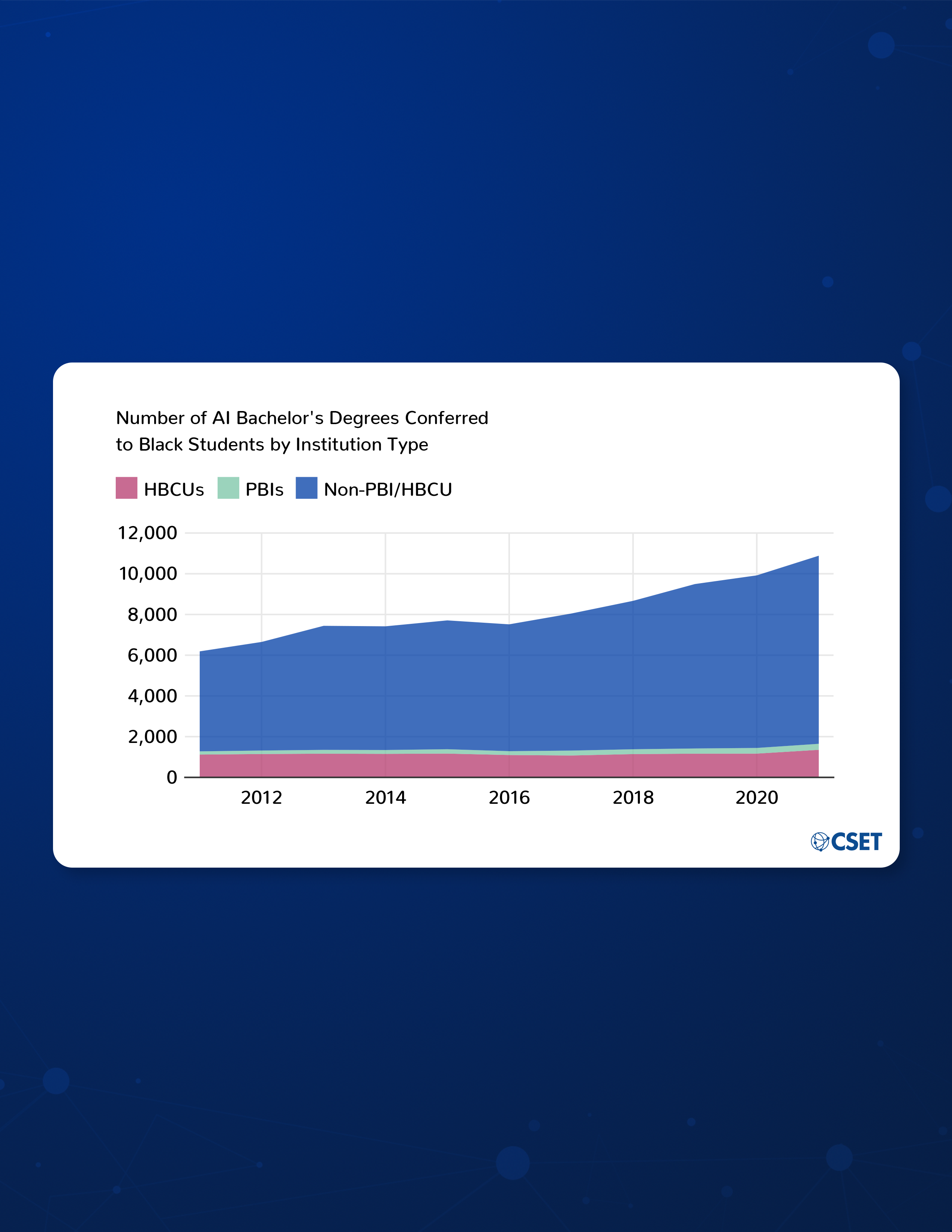In this fifth snapshot in CSET’s Education series, we examine the roles of historically black colleges and universities (HBCUs) and other universities in AI, STEM, and general degree conferrals for Black students in the United States. For an analysis on Black students’ degree representation in AI-related fields, see CSET’s last snapshot.
Consistent with our previous snapshots, we use Integrated Postsecondary Education Data System (IPEDS) data and consider computer science, bioinformatics, computer and electrical engineering, nanotechnology, and cybersecurity majors to be “AI-related.” In addition to IPEDS, we use data from the U.S. Department of Education’s College Scorecard platform to determine universities’ Predominantly Black Institution (PBI) status.1 Note that HBCUs and PBIs are mutually exclusive. HBCUs include accredited colleges and universities established before the Civil Rights Act of 1965 whose stated missions are to educate Black Americans. HBCUs are not classified as PBIs, which are post-secondary institutions with at least 40 percent Black enrollment, among other requirements.2 Experts cite HBCUs and PBIs as critical for providing supportive environments for Black students and helping bridge racial education gaps (see here, here, here, and here). For example, studies find that HBCUs graduate more low-income Black students and graduate more Black students who later earn a PhD (see also here and here).
HBCU and PBIs’ Roles in Overall, STEM, and AI Bachelor’s Degrees
Together, PBIs and HBCUs comprised approximately 20 percent of all-subject and STEM bachelor’s degree conferrals for Black students over the past decade. HBCUs comprised a decreasing share over time of all-subject and STEM Black bachelor’s degrees between 2011 and 2021. Figure 1 compares all-subject, STEM, and AI-related bachelor’s degree conferral rates from HBCUs and PBIs (combined). HBCUs’ share of Black graduates decreased from 21 percent to 17 percent for all subjects and from 25 percent to 19 percent for STEM. Still, HBCUs and PBIs are overrepresented in Black students’ undergraduate STEM education compared to Black students’ national undergraduate STEM education (Black STEM students represented 7 percent of overall STEM students in 2021).
Note that while HBCUs’ share of Black graduates decreased between 2011 and 2021, the absolute numbers of Black students graduating from HBCUs still increased for STEM majors (26 percent growth). Across all subjects, HBCUs conferred approximately the same number of bachelor’s degrees to Black students between 2011 and 2021.
Figure 1. Portion of Bachelor’s Degrees from HBCUs and PBIs Declined since 2011

Figure 2 shows that Black students’ AI bachelor’s degrees are less frequently conferred by HBCUs or PBIs than bachelor’s degrees in general. The share of Black AI graduates from HBCUs has modestly decreased over the past decade from about 21 percent down to 15 percent. The share of Black AI graduates from PBIs remained just under 3 percent. Other institutions constituted a larger portion of Black AI bachelor’s graduates over time. This finding is consistent with a previous study using data from 2016 revealing that HBCUs were less represented in Black students’ undergraduate computational sciences education.
Figure 2. Non-PBI/HBCU AI Bachelor’s Degree Conferrals to Black Students Increased since 2011
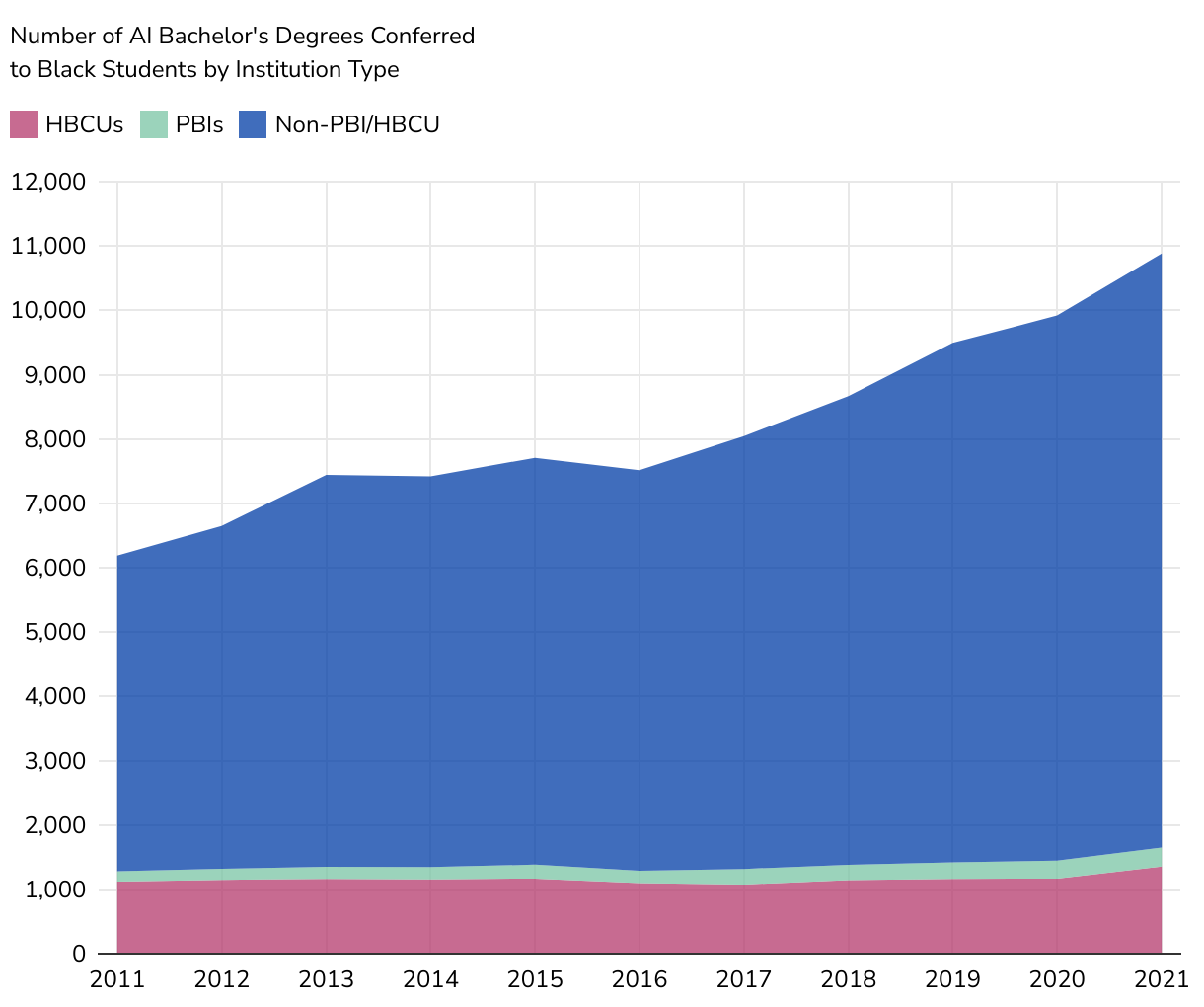
While the number of Black students earning AI-related undergraduate degrees from HBCUs and PBIs increased since 2011, we see the most growth among institutions that are neither HBCUs nor PBIs.
Top Institutions for Black Students Pursuing AI-Related Bachelor’s Degrees
Table 1 displays the universities with the most Black AI graduates between 2015–2021. Several of the top 10 universities overlap with the top conferrers of AI degrees for all students, including the University of Maryland Global Campus and the University of Phoenix. Notably, three of the top 10 conferrers of Black students’ AI-related bachelor’s degrees are a PBI or HBCU: Georgia State University, North Carolina A&T State University, and Morgan State University.
Table 1. Top AI Bachelor’s Conferring Institutions for Black students since 2015
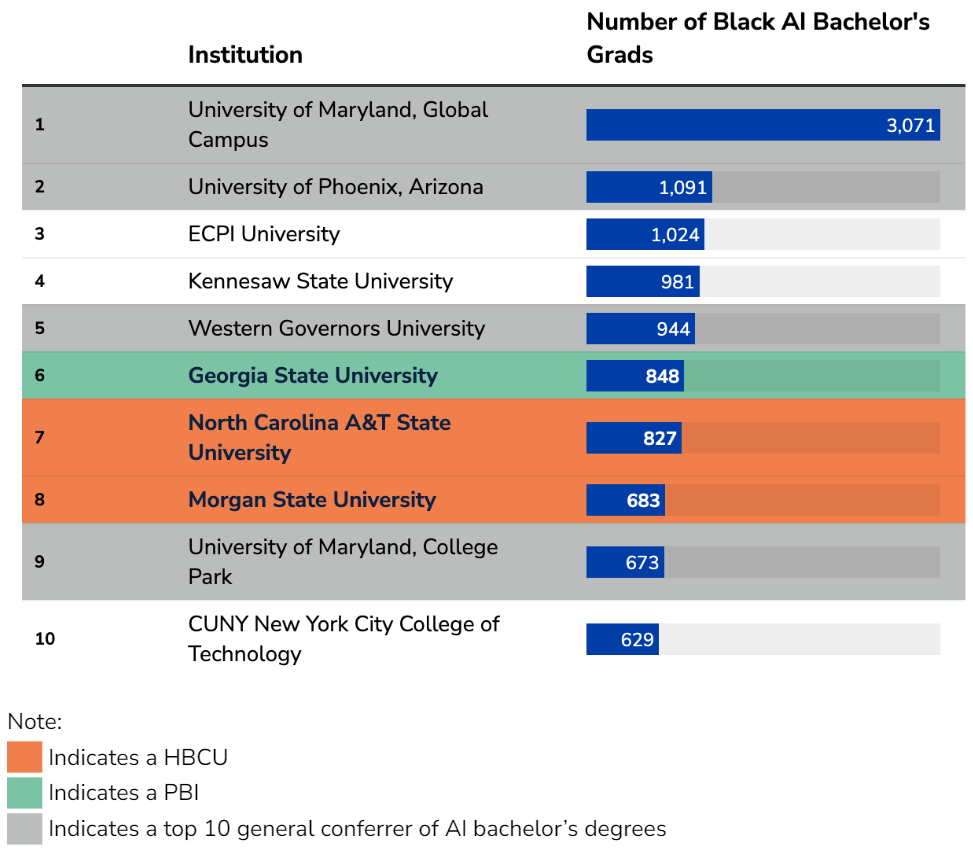
Interestingly, there are distinct geographical trends for Black AI bachelor’s graduates. States in the Southeast, like Georgia and Alabama, had more AI degrees conferred to Black students compared to states that conferred the most AI degrees to all students. This may be due in part to the high concentration of HBCUs and PBIs in the Southeast or large Black populations in the Southeast. Maryland graduated high numbers of Black students in AI-related fields; notably, three of the University of Maryland’s campuses, including its online campus, cracked the top 10 institutions for graduating Black undergraduate students.
Table 2. Top 10 States by AI Bachelor’s Degrees Conferred to Black Students since 2015

Black Students’ All-Subject and STEM Graduate (Master’s and PhD) Degrees
As shown in Figure 3, the share of Black master’s graduates from HBCUs declined between 2011 and 2021. Most notably, the share of Black STEM master’s graduates from HBCUs fell from 10 percent in 2011 to 5 percent in 2021. In terms of PhDs, the share of Black PhD graduates from HBCUs dropped from 8 percent in 2011 to approximately 6 percent in 2021. HBCUs’ share of Black STEM PhD graduates also experienced a modest drop from roughly 10 percent to 8 percent.
Figure 3. The Percentage of Black Students Earning Graduate Degrees from HBCUs and PBIs Decreased since 2011
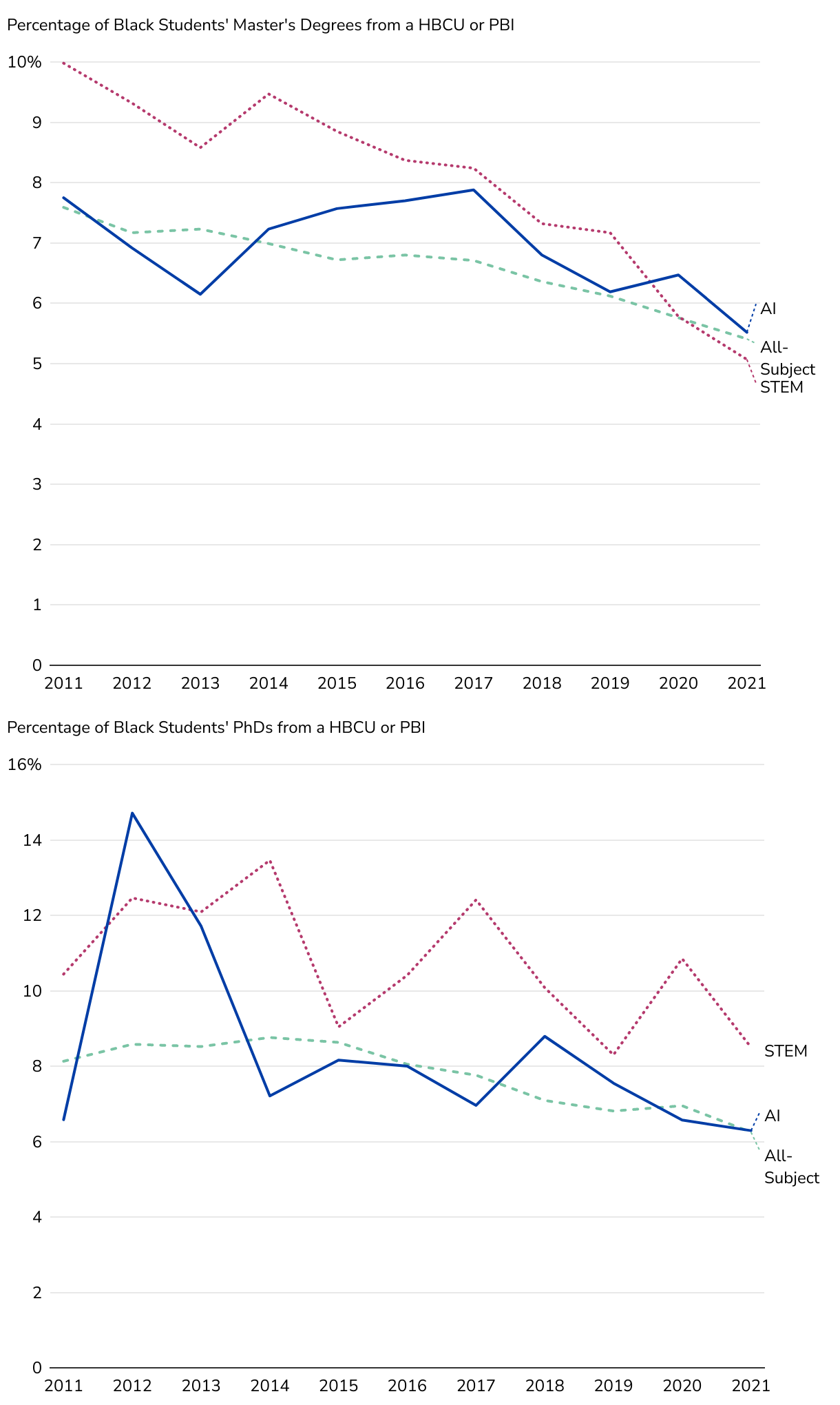
The share of AI PhDs that went to Black students increased between 2011 and 2021 (see our last Data Snapshot). But as shown in Figure 4, most Black AI PhD growth in that period was driven by non-HBCUs. The number of Black AI PhD graduates from non-HBCUs increased while HBCUs’ share of Black AI PhD conferrals dropped from a peak of 15 percent in 2012 to 6 percent in 2021 (see Figure 3). Note that the decline in the share of Black AI PhDs coming from HBCUs is not due to fewer students graduating from HBCUs, but rather more Black students attending non-HBCUs.
We see a similar trend for AI master’s degrees. The number of AI master’s graduates from HBCUs grew by 65 percent between 2011 and 2021, but non-HBCU AI master’s graduates grew by 137 percent.
Figure 4A. AI Master’s and PhDs Conferrals to Black Students from Non-HBCUs Are Increasing Dramatically
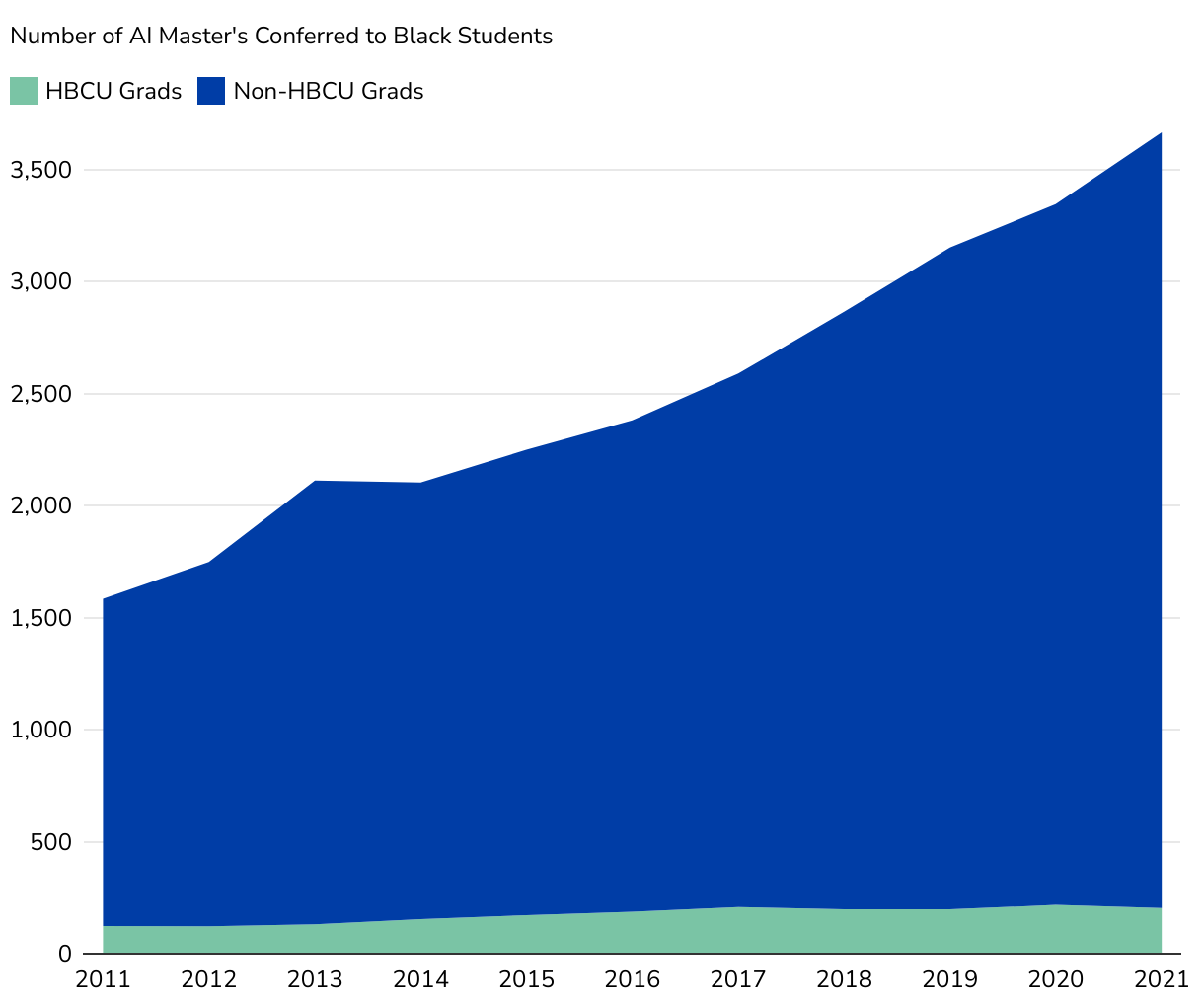
Figure 4B. Black Students’ AI-Related Doctorate Conferrals
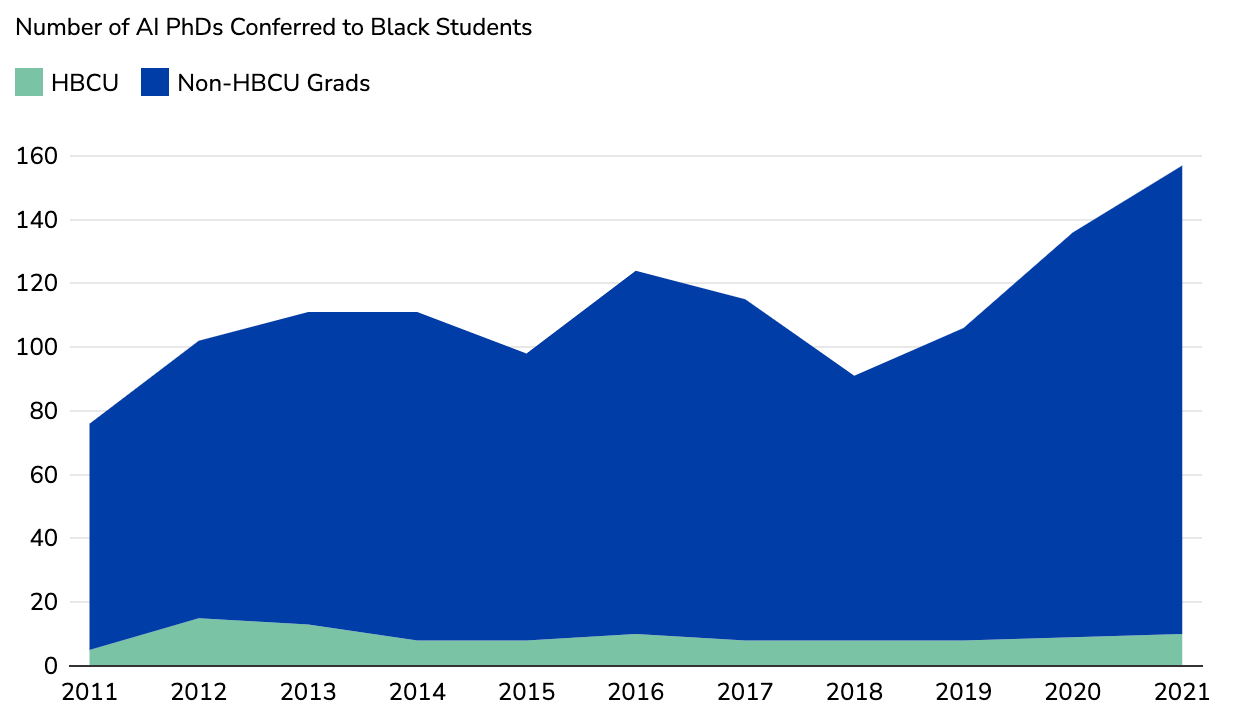
Top Schools Conferring AI Master’s and PhD Degrees to Black Students
Table 3 displays the top 10 institutions conferring AI-related master’s degrees to Black students.
Table 3. AI Master’s Conferrals to Black Students since 2015

There is a stark difference between the institutions listed in Table 3 and the leading AI-related bachelor’s-graduating institutions for Black students listed in Table 1. Most (seven of 10) of the universities in Table 3 are primarily online institutions; the only exceptions are North Carolina A&T State University (an HBCU), DePaul University, and Kennesaw State University. Additionally, the top conferrers of AI-related master’s degrees for Black students are distinct from the top conferrers of AI-related master’s degrees for all students as seen in our first Education Snapshot. Private, for-profit institutions and primarily-online institutions comprise more of the top conferrers for Black students than for all students.
Table 4 displays the top AI PhD conferring institutions for Black students. This list also looks different from top bachelor’s conferring institutions in Table 1. North Carolina A&T University, an HBCU, is the most prolific brick-and-mortar institution conferring AI-related PhDs to Black students. Florida A&M, also an HBCU, comes in 9th overall and tied 5th for the most prolific on-campus institution. Table 4 also diverges from the list of top AI PhD conferring institutions for all students in that there are fewer “elite” universities and half are online or for-profit programs—compared to 0 of 10 for the top AI-related doctorate-conferring institutions for all students.
Table 4. AI PhD Conferrals to Black Students since 2015
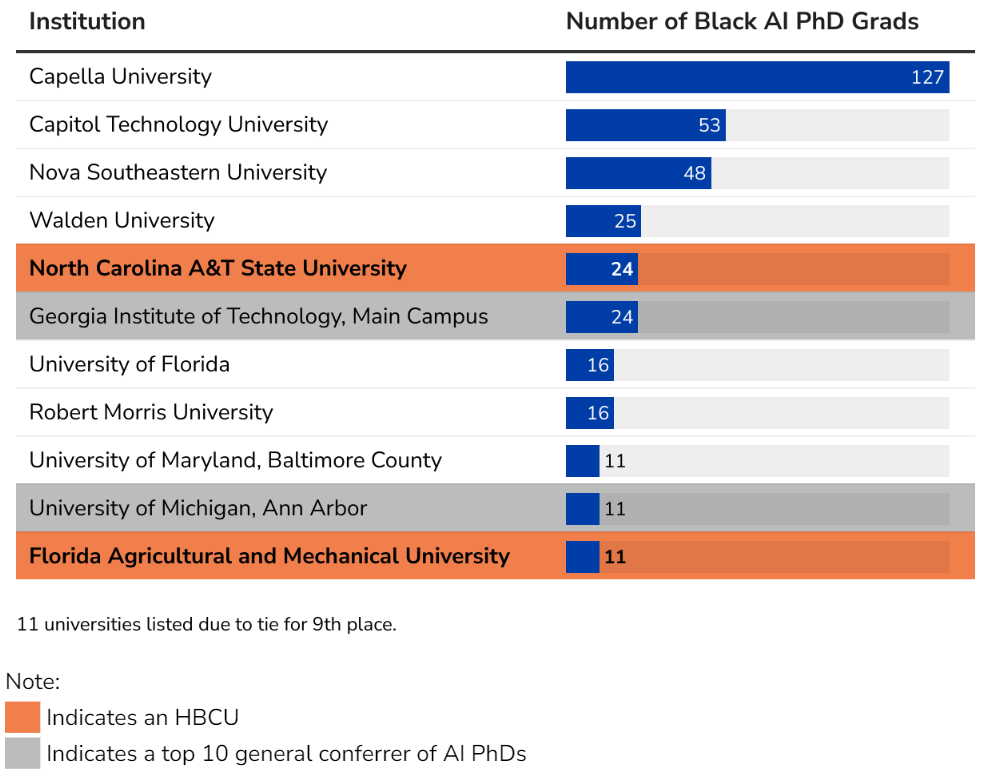
Takeaways
While HBCUs and PBIs comprise a small percentage of total degree-granting institutions, they conferred roughly 20 percent of undergraduate degrees to Black students between 2011 and 2021. HBCUs confer a notable share of undergraduate STEM degrees to Black students, but awarded proportionally fewer AI bachelor’s degrees. Despite HBCUs’ decreasing share of degree conferrals for Black students, they are conferring an increasing number of STEM and AI degrees at all degree levels. Additionally, HBCUs saw record applications and enrollment in 2020 and 2021, which may not be reflected in this data, indicating a possible reversal in the trends found in this analysis. Given that HBCUs tend to be smaller than many public schools or state flagship institutions, it is possible that the decrease in HBCUs’ share of Black AI and STEM degree conferrals is not due to a decrease in demand by Black students (especially given the record enrollments at HBCUs in recent years), but by bottlenecks in current resources at HBCUs.3
There have been some initiatives to grow AI and tech-related programs at HBCUs in recent years, including a $9 million grant for Morgan State University awarded in 2022 and a $100,000 grant from Microsoft to Tuskegee University in 2023. Still, these awards pale in comparison to funding for non-HBCUs like the ones featured in the first CSET education Snapshot; the leading non-HBCUs often hold large endowments in the billions of dollars and regularly win multi-million-dollar grants. HBCUs, particularly those that have seen high student demand in recent years, may therefore continue to benefit from increased investment into infrastructure that would help them build AI-related programs as they support Black students.
Lastly, we found a higher proportion of for-profit and online-only institutions as the top-degree-conferring institutions for Black students when compared to the lists of general top AI-related degree conferring institutions. This phenomenon may be due to issues related to flexibility and cost; for example, studies have shown that Black students work full-time and are caregivers for family members at twice the rates of other students. Fifty-nine percent of Black students rated flexibility as “very important,” 22 percentage points more than all other students.
Considering the importance of high-quality education, the potential predatory problems associated with certain for-profit institutions,4 and the relevant role of HBCUs in Black students’ higher education, building up infrastructure at HBCUs to support AI-relevant education and encouraging all institutions (HBCUs and non-HBCUs) to consider the needs of minoritized students—like lower costs and greater flexibility—may encourage more Black students to pursue AI-related higher education.
- We use IPEDS’ classification for HBCUs. PBI status is based on College Scorecard classifications as of 2021 – this means if a university was considered a PBI in 2012 but not in 2021, we do not include it in our analysis. We do not examine predominately-black institutions (PBI) for master’s and doctoral students, because the PBI distinction relies on undergraduate rather than graduate enrollments.
- PBIs must also serve at least 1,000 undergraduate students, have comparatively low per-student expenditures compared to peer institutions, and first-generation or low-income students must comprise at least 50 percent of their undergraduate student bodies.
- Evidenced by issues such as limited on-campus housing for undergraduate students. E.g., https://edtrust.org/the-equity-line/hbcu-enrollment-is-on-the-rise-but-on-campus-housing-is-scarce-black-college-students-demand-solutions/ or re-emerging domestic threats at HBCUs as racial tensions rise: https://www.washingtonpost.com/education/2022/02/11/hbcu-enrollment-growth-bomb-threats/
- E.g., https://www.brookings.edu/blog/how-we-rise/2021/01/12/the-for-profit-college-system-is-broken-and-the-biden-administration-needs-to-fix-it/ and https://www.theguardian.com/commentisfree/2019/dec/09/i-taught-at-a-for-profit-college-theyre-predatory-disasters and https://www.nytimes.com/2023/04/13/us/supreme-court-student-loans.html
